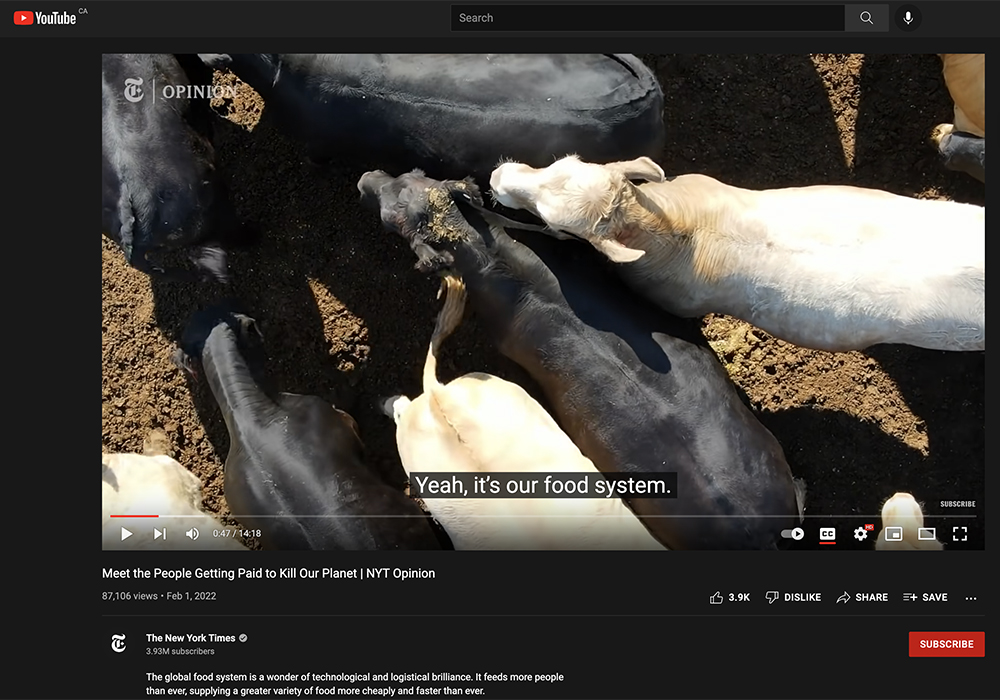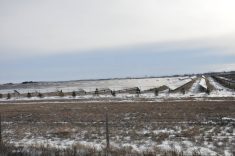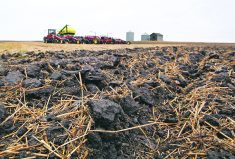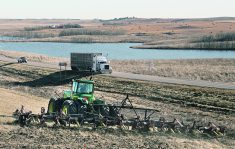As deep winter reasserted itself over most of the nation’s farms and ranches, the New York Times brought some real heat to the Big-Ag-fights-climate-change debate.
In a 14-minute video titled “Meet the People Getting Paid to Kill Our Planet,” the film’s subtitle not only names the killers, it convicts them, too: “American agriculture is ravaging the air, soil and water” and, it adds, “but a powerful lobby has cleverly concealed the damage.”
The “powerful lobby,” says the newspaper, is the American Farm Bureau Federation (AFBF), the nation’s largest farm group.
Read Also

High prices see cow-calf producers rushing to incorporate
Farm accountants are reporting a steady stream of cow-calf producers rushing to get their operations incorporated ahead of selling their calves this fall.
To hear the Times tell it, AFBF is at the centre of Big Ag’s “web of industries” responsible for “churning out at least one-third of all greenhouse gas emissions around the world.”
Well, maybe not, according to the Environmental Protection Agency.
The United States is the world’s second-largest contributor to climate change; China is first. EPA data shows that 25 percent of all global greenhouse gases derive from “electricity and heat production,” 21 percent from “industry,” and 24 percent from “agriculture, forestry, and other land use.”
In the U.S., however, “agriculture,” notes EPA, is responsible for 10 percent of all greenhouse gases. Whatever number you choose, neither is “at least one-third of… all.”
But the Times’ video sticks with its figure to then determine that agriculture is a “significant polluter,” responsible, in fact, for annual emissions that are “about the same as 143 million cars,” or one-half of all vehicles in the U.S.
Again, not so, according to EPA data.
The video points to fat profits as the reason for all ag’s emissions. “Annual profits?” it asks, before immediately answering: “about $116 billion.”
If only that were true. But this is farming and ranching, two notoriously feast-or-famine businesses where profits rise and fall faster than the local creek. In 2020, for example, U.S. net farm income was $121 billion; in 2016, it was half that, or $62.3 billion.
Adding legitimacy to the Times video is New Jersey Democrat Cory Booker, a member of the Senate agriculture committee. Booker makes a handful of appearances throughout the video to note, correctly, that any solution to our worsening climate predicament will also require fixing “the American and global food system.”
Quickly, however, that contention is jettisoned for the video’s central theme: “It’s time for you to ditch your view of the farm,” the narrator urges. To drive home the point, an activist attorney appears on camera to say a cow’s gassy “burp” is like a bullet — it “doesn’t last long-term but it can have a big impact.”
Finally, we are introduced to the video’s fall guy, Zippy Duvall, the Georgia dairy producer who serves as AFBF’s current president. Zippy and his allies are “out to destroy the truth,” “buy influence” and have “gotten away with” defeating any regulation of ag-generated methane by labelling any effort to do so as a “cow tax.”
“That’s the Big Ag lobby, baby,” the narrator breezily notes, adding a bit later on a different AFBF stand: “Seriously, that is some manure lagoon-sized b.s.”
The Times describes the video editorial as an “innovative video journalism commentary.”
It’s not; it’s a sloppy slice of half-truths and loose connections presented in a casual, “Yo, bro!” style that generates more derision than discussion.
AFBF thought the snarky editorial so off the mark it didn’t even publicly comment on it. Why would it? Having the Times as an enemy only raises AFBF’s credibility in Republican rural America.
Make no mistake, though, AFBF and Big Ag can’t do enough climate penance in the coming two generations to make up for the climate sins they’ve committed in just this generation. But it’s not alone. Like senator Booker notes, the world won’t fix the wobbling climate unless the world fixes all farming and food from, literally, the ground up.
That means the AFBF, the Times, and you and me.
Alan Guebert is an agricultural commentator from Illinois.



![Protesters crowd a street carrying signs that read, "Global warming real. In other news, water is wet," and "Stop denying the [blue painted pic of the Earth] is dying."](https://static.producer.com/wp-content/uploads/2025/07/29145152/158171_web1_2019-10-18T222818Z_1221762151_RC14C26A65A0_RTRMADP_3_CLIMATE-CHANGE-THUNBERG-1200-220x165.jpg)











